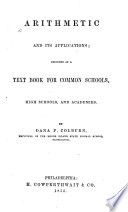 | Dana Pond Colburn - Arithmetic - 1855 - 396 pages
...them. (d.) From these definitions and the principles previously established, it follows that, — 1. A multiple of a number must contain all the prime...numbers must contain all the prime factors of each of them. 3. The least common multiple of two or more numbers must be the smallest number which contains... | |
 | Dana Pond Colburn - Arithmetic - 1856 - 392 pages
...them. (d.) From these definitions and the principles previously established, it follows that, — 1. A multiple of a number must contain all the prime factors of that numker. 2. A common multiple of two or more numbers must contain all the prime factors of each of them.... | |
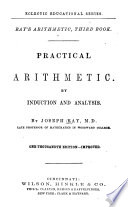 | Joseph Ray - Arithmetic - 1857 - 348 pages
...Thus, 10 is not divisible by 6, because 3, one of the prime factors of 6, is not a factor of 10. Hence, a common multiple of two or more numbers must contain all the prime factors in those numbers; and, To be the least common multiple, (LCM), it must not contain any prime factor... | |
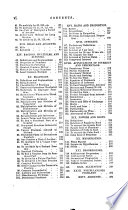 | Dana Pond Colburn - 1858 - 288 pages
...factors. (d.) From these definitions, and the principles previously established, it follows that — 1st. A multiple of a number must contain all the prime factors of that number. 2d. A common multiple of two or more numbers must contain all the prime factors of those numbers. 3d.... | |
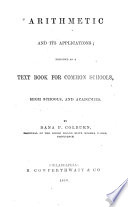 | Dana Pond Colburn - Arithmetic - 1860 - 388 pages
...them. (d.) From these definitions and the principles previously established, it follows that, . — 1. A multiple of a number must contain all the prime...numbers must contain all the prime factors of each of them. 3. The least common multiple of two or more numbers must be the smallest number which contains... | |
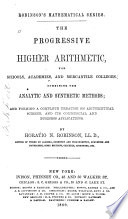 | Horatio Nelson Robinson - Arithmetic - 1860 - 444 pages
...multiple. FIRST METHOD. From the relations of multiple and divisor we have the following properties : I. A multiple of a number must contain all the prime factors of that number. II. A common multiple of two or more numbers must contain all the prime factors of each of those numbers.... | |
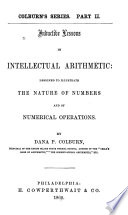 | Dana Pond Colburn - Arithmetic - 1860 - 158 pages
...number which is a multiple of each of them. 4. Multiples have the following properties : — 1st. Every Multiple of a number must contain all the prime factors of that number. 2d. Every Common Multiple of two or more numbers must contain all the prime factors of each of those... | |
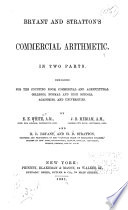 | Emerson Elbridge White - Arithmetic (Commercial), 1861 - 1861 - 348 pages
...of two or more numbers must contain all the prime factors of each of the numbers, and that the least common multiple of two or more numbers must contain all the prime factors only the greatest number of times they are found in any of the numbers. ART. 22. To find the least... | |
 | Edward Brooks - Arithmetic - 1863 - 350 pages
...definitions and the principles of factoring, we have the following propositions : — PROP. I. — A multiple of a number must contain all the prime factors of that number. PROP. II. — A common multiple of two or more numbers must contain all the prime factors of each of... | |
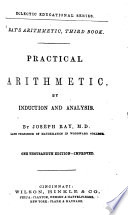 | Joseph Ray - Arithmetic - 1857 - 358 pages
...Thus, 10 is not divisible by C, because 3, one of the prime factors of G, is not a factor of 10. Hence, a common multiple of two or more numbers must contain all the prime factors in those numbers; and, To be the least common multiple, (LCM), it must not contain any prime factor... | |
| |